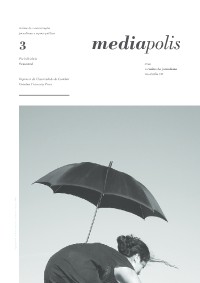Please use this identifier to cite or link to this item:
https://hdl.handle.net/10316.2/41217| Title: | La formation au journalisme est-elle utile/indispensable: quelques leçons du passé et du présent pour préparer l’avenir | Other Titles: | Is training in journalism useful/indispensable: some lessons from the past and the present to prepare the future | Authors: | Delporte, Christian | Keywords: | Professionalism;training;general culture;formatting;technicization;critical mind;Professionnalisation;formation;culture générale;formatage;technicisation;esprit critique;Profissionalização;formação;cultura geral;formatação;tecnicização;espírito crítico | Issue Date: | 2016 | Publisher: | Imprensa da Universidade de Coimbra | Abstract: | Este artigo examina as numerosas e recorrentes
críticas que visam a formação de jornalistas (superficialidade, formatação, tecnicismo, ineficácia face ao mercado de trabalho e aos novos instrumentos tecnológicos – Internet –, reprodução social) e tenta enquadrá-las numa perspetiva histórica e comparativa. A criação de escolas
de jornalismo, mais do que decorrente de uma vontade em preparar para as técnicas, constituiu-se como projeto de caráter ideológico cujas origens e fundamentos foram posteriormente esquecidos. O debate acerca do equilíbrio entre teoria e prática
repete-se desde há um século. Entretanto,
as formações foram-se afastando da cultura académica a fim de responderem diretamente às supostas necessidades – e contraditórias – dos empregadores. As formações de futuro são aquelas que demonstrem produzir profissionais capazes
de dar resposta aos desafios da informação do futuro, com uma sólida cultura, condição essencial ao desenvolvimento do espírito crítico. L’article examine les critiques nombreuses et répétées dont les formations au journalisme sont la cible (superficialité, formatage, technicisme outrancier, inefficacité face au marché du travail et aux nouveaux outils technologiques -Internet -, reproduction sociale) et les resitue dans une perspective historique et comparative. La création des écoles et des filières de journalisme n’ont jamais uniquement relevé de la volonté de former à des techniques mais de projets à caractère idéologique dont on a, depuis, oublié les fondements. Le débat sur l’équilibre entre théorie et pratique est récurrent depuis plus d’un siècle. Cependant, les formations ont peu à peu gommé la culture académique pour répondre aux besoins supposés – et contradictoires – des employeurs. Les formations d’avenir sont celles capables de produire des professionnels répondant aux défis de l’information du futur, solidement pourvus d’une culture solide et ouverte, condition essentielle au développement de l’esprit critique. This article analyses the numerous and recurrent criticisms aimed at the training of journalists (superficiality, formatting, technicality, inefficiency towards labour market and new technological tools - Internet, social reproduction) and tries to place them in a historical and comparative perspective. Establishing journalism schools, rather than arising from a willingness to prepare for technical tools, was part of an ideological project whose origins and foundations were later forgotten. The debate over the balance between theory and practice has been repeated for a century. In the meantime, training has moved away from academic culture to respond directly to the supposed - and contradictory - needs of the employers. Future trainings are those that demonstrate to be able to produce professionals who will be able to respond to the challenges of information in the future, backed by a solid culture, an essential condition for a critical mind. |
URI: | https://hdl.handle.net/10316.2/41217 | ISSN: | 2183-5918 2183-6019 (PDF) |
DOI: | 10.14195/2183-6019_3_2 | Rights: | open access |
| Appears in Collections: | Mediapolis |
Files in This Item:
| File | Description | Size | Format | |
|---|---|---|---|---|
| la_formation_au_journalisme.pdf | 574.73 kB | Adobe PDF |  |
Items in DSpace are protected by copyright, with all rights reserved, unless otherwise indicated.
